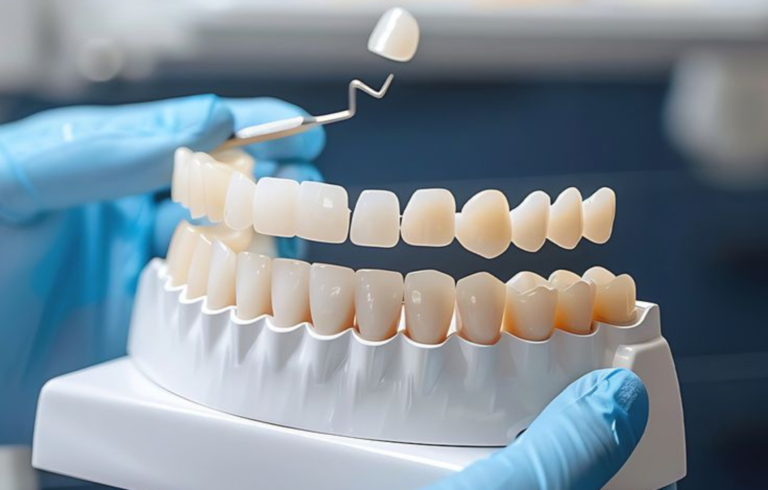
Veneers are thin, custom-designed coverings, bonded to the front of the teeth to boost their appeal. They are usually used to address discolouration, chips or gaps. They are generally made of Porcelain, Composite resin, Lithium Disilicate (e.max) and Zirconia. Veneers require minimal tooth alteration when compared to other alternatives. Let’s explore the answers to some of the most popular questions like “How long do veneers last?” and “When to replace veneers?”.
How Long Do Veneers Last?
Veneers made from Porcelain or advanced Esthetic Zirconia usually last for 10 to 30 years, if precautions are taken. Composite veneers lasts for 4 to 8 years. It is essential to be cautious with hot or sticky foods that could damage or chip the veneers. It is necessary to schedule regular checkups and avoid teeth grinding.
When to Replace Veneers
1. Wear and tear: Activities like chewing and grinding lead to the gradual degradation of veneers. For those who grind their teeth due to stress, the veneers wear down quickly. Some of the indications of problems due to wear and tear include dull appearance, increased sensitivity and uneven surfaces.
2. Chipping or cracking: Trauma to the mouth due to injuries, accidents, or biting unusual hard objects can cause chipping. Nail biting can also lead to damage. Some of the signs include noticeable breaks in the veneer, uneven edges and pain in the affected area.
3. Staining: Certain foods like coffee, tea, and berries can lead to staining, especially in composite Veneers. Smoking can also cause discolouration of Veneers. The veneers can become darker or yellow and lose their vibrancy due to staining.
4. Gum recession: Natural ageing, aggressive, brushing, and periodontal disease can lead to gum recession and expose the edges of veneers. The signs of gum recession include visible edges of veneers at the gum line, increased sensitivity to heat and cold, and aesthetic disturbances.
5. Underlying tooth issues: Cavities or decay can develop under the veneers due to inadequate oral hygiene which can compromise the veneer’s effectiveness. Tooth pain, visible dark spots on tooth or veneer and bad breath, are signs of decay or infection.
6. Loose bonding: Factors such as aging of materials and improper bonding during application can cause loosening. The signs of loosening include movement of the veneer and visible spaces between the veneer and the tooth.
Maintenance of veneers
• Brushing twice daily a gentle toothpaste and flossing regularly helps to prevent gum disease.
• Avoiding hard and sticky foods helps in avoiding damage to veneers.
• Wearing a night guard will protect the veneers from the effect of grinding teeth.
• Regular dental checkups help to monitor the condition of veneers.
• After consuming staining foods and drinks, it is essential to rinse the mouth to minimise discoloration.
Closing Remarks
It is essential to be mindful of wear and tear chipping, staining, gum recession, underlying tooth issues and loose bonding as these factors can necessitate replacement. The quality of veneers and their design plays a major role in their longevity.
At Uptown Dental Lab, we offer high-quality veneers made from IPS e.max® lithium disilicate and Esthetic Zirconia with both durability and aesthetic appeal. We utilise advanced materials and techniques to ensure the perfect fit.
